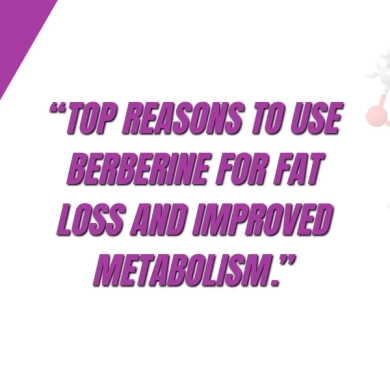Berberine for Longevity: Can This Ancient Compound Help You Live Longer?
In the quest for longevity and improved health, natural compounds are gaining significant attention. Among these, Berberine, an ancient compound used for centuries in traditional medicine, is emerging as a potential key to a longer, healthier life. This blog delves into the anti-aging benefits of Berberine, exploring how it combats oxidative stress, improves metabolic function, and supports cellular health. Could Berberine be the modern-day fountain of youth? Let’s find out.
What is Berberine?
Berberine is a bioactive compound extracted from several plants, including goldenseal, barberry, and Oregon grape. Traditionally, it has been used in Chinese and Ayurvedic medicine to treat various ailments such as infections, digestive issues, and inflammatory conditions. The compound is known for its bright yellow color and bitter taste, but its real power lies in its numerous health benefits.
Berberine works by activating a critical enzyme called AMP-activated protein kinase (AMPK), often referred to as the “metabolic master switch.” This enzyme plays a crucial role in regulating metabolism and energy balance, which are fundamental processes for overall health and longevity.
The Science Behind Berberine for Longevity
Research into Berberine’s impact on longevity is still in its early stages, but the findings so far are promising. Several studies have shown that Berberine can positively affect various biological processes associated with aging, including cellular health, mitochondrial function, and metabolic regulation.
In animal studies, Berberine has been observed to extend lifespan by improving metabolic function and reducing the risk of age-related diseases. Although more human studies are needed, these findings suggest that Berberine could be a powerful tool in the pursuit of longevity.
Combating Oxidative Stress with Berberine
Oxidative stress, caused by an imbalance between free radicals and antioxidants in the body, is a significant contributor to aging. It leads to cellular damage, inflammation, and the breakdown of tissues, accelerating the aging process. Berberine has been shown to possess potent antioxidant properties, helping to neutralize free radicals and reduce oxidative stress.
By mitigating oxidative stress, Berberine may not only slow down the aging process but also improve skin health, reducing wrinkles and promoting a youthful appearance.
Metabolic Health and Longevity
Metabolism plays a critical role in how our bodies age. Poor metabolic health can lead to a variety of age-related conditions, including diabetes, obesity, and cardiovascular disease. Berberine has been extensively studied for its effects on metabolic health, particularly its ability to regulate blood sugar levels and improve insulin sensitivity.
By enhancing metabolic function, Berberine helps manage weight, reduce the risk of metabolic syndrome, and support overall longevity. Its impact on blood sugar regulation is so profound that some researchers compare it to the effects of metformin, a widely prescribed diabetes drug.
Berberine and Cardiovascular Health
Cardiovascular disease remains one of the leading causes of death worldwide, particularly among older adults. Berberine has shown promise in supporting heart health by lowering cholesterol levels, reducing blood pressure, and improving circulation.
These cardiovascular benefits are crucial for longevity, as a healthy heart is essential for a long and active life. Berberine’s ability to reduce inflammation and oxidative stress further contributes to its heart-protective effects, making it a valuable ally in the fight against cardiovascular disease.
Berberine’s Effect on Inflammation
Chronic inflammation is often referred to as a “silent killer” because it contributes to many age-related diseases, including heart disease, cancer, and Alzheimer’s disease. Berberine exhibits strong anti-inflammatory properties, helping to reduce inflammation at the cellular level.
By decreasing chronic inflammation, Berberine may help slow the aging process and reduce the risk of developing chronic diseases, thereby promoting a longer, healthier life.
Gut Health and Longevity
The gut microbiome is increasingly recognized as a key player in overall health and longevity. A balanced gut microbiome supports digestion, immune function, and even mental health. Berberine has been shown to modulate the gut microbiome, promoting the growth of beneficial bacteria while inhibiting harmful pathogens.
Improved gut health not only enhances nutrient absorption but also supports a healthy immune system, both of which are crucial for longevity. By fostering a balanced gut microbiome, Berberine may contribute to a longer, healthier life.
Berberine and Mitochondrial Function
Mitochondria, often referred to as the powerhouses of the cell, play a vital role in energy production and cellular health. As we age, mitochondrial function declines, leading to decreased energy levels and increased susceptibility to age-related diseases.
Berberine has been shown to enhance mitochondrial function by increasing the production of adenosine triphosphate (ATP), the energy currency of the cell. This boost in energy production can help combat the fatigue and cellular decline associated with aging, supporting overall vitality and longevity.
Berberine and Autophagy
Autophagy is the body’s process of cleaning out damaged cells and regenerating new ones, a crucial mechanism for maintaining cellular health and longevity. As we age, autophagy becomes less efficient, leading to the accumulation of cellular debris and contributing to the aging process.
Berberine has been found to stimulate autophagy, promoting the removal of damaged cells and supporting cellular renewal. This process helps maintain tissue health, potentially slowing the aging process and extending lifespan.
Potential Side Effects and Precautions
While Berberine offers many potential benefits, it’s important to be aware of possible side effects and precautions. Common side effects include gastrointestinal issues such as diarrhea, constipation, and stomach cramps. These side effects are generally mild and can often be managed by adjusting the dosage.
Berberine may not be suitable for everyone. Pregnant or breastfeeding women, individuals with low blood pressure, and those taking certain medications, such as blood thinners or diabetes drugs, should consult a healthcare provider before taking Berberine. It’s also important to monitor blood sugar levels closely if you are using Berberine for its glucose-regulating effects.
How to Incorporate Berberine into Your Routine
To maximize the longevity benefits of Berberine, it’s important to take it correctly. The recommended dosage for most people is between 500 to 1500 mg per day, divided into two or three doses. Berberine is available in various forms, including capsules, powders, and extracts.
For best results, it’s advisable to take Berberine with meals to enhance absorption and minimize potential gastrointestinal side effects. As with any supplement, consistency is key, so incorporating Berberine into your daily routine can help you reap the long-term benefits.
Comparing Berberine with Other Longevity Supplements
Berberine is often compared with other popular longevity supplements, such as resveratrol and metformin. While resveratrol is known for its antioxidant properties and metformin for its glucose-lowering effects, Berberine offers a unique combination of benefits, including metabolic regulation, anti-inflammatory effects, and mitochondrial support.
Unlike resveratrol, which primarily targets oxidative stress, or metformin, which focuses on blood sugar control, Berberine addresses multiple pathways associated with aging, making it a versatile addition to any longevity regimen.
Real-Life Success Stories
Many individuals have experienced positive results from incorporating Berberine into their health routines. Testimonials from users report improved energy levels, better blood sugar control, and enhanced overall well-being. Case studies have also highlighted Berberine’s impact on weight management and metabolic health, contributing to its reputation as a powerful anti-aging supplement. People have loved Berberine Prime from humangrowthhormones.com and if you are interested in buying Berberine supplement, you can give it a try.
Berberine is a promising compound with the potential to support longevity and overall health. Its ability to combat oxidative stress, improve metabolic function, and support cellular health makes it a valuable tool in the fight against aging. While more research is needed to fully understand its long-term effects, Berberine offers a natural, multi-faceted approach to promoting a longer, healthier life.
For more such blogs visit humangrowthhormones.com/blog-for-fitness-tips-and-advice/ and if you want to buy high quality premium supplements, visit humangrowthhormones.com and choose from a variety of supplements like Berberine Prime, Alpha Max, Cut and Ripped, and many more.
FAQs
What is the Best Time to Take Berberine for Longevity?
It’s best to take Berberine with meals to enhance absorption and reduce the risk of gastrointestinal discomfort.
Can Berberine Be Taken Long-Term?
Yes, Berberine can be taken long-term, but it’s important to monitor for any side effects and consult with a healthcare provider, especially if you have underlying health conditions.
How Quickly Can You Expect to See Results?
Some individuals may notice improvements in energy levels and metabolic health within a few weeks, but long-term benefits like enhanced longevity may take several months to become evident.
Is Berberine Safe for Everyone?
While Berberine is generally safe for most people, it may not be suitable for pregnant or breastfeeding women, individuals with low blood pressure, or those on certain medications.
Where Can I Buy High-Quality Berberine?
Berberine is widely available at health food stores, pharmacies, and online. It’s important to choose a reputable brand that offers third-party testing for purity and potency.









Add comment